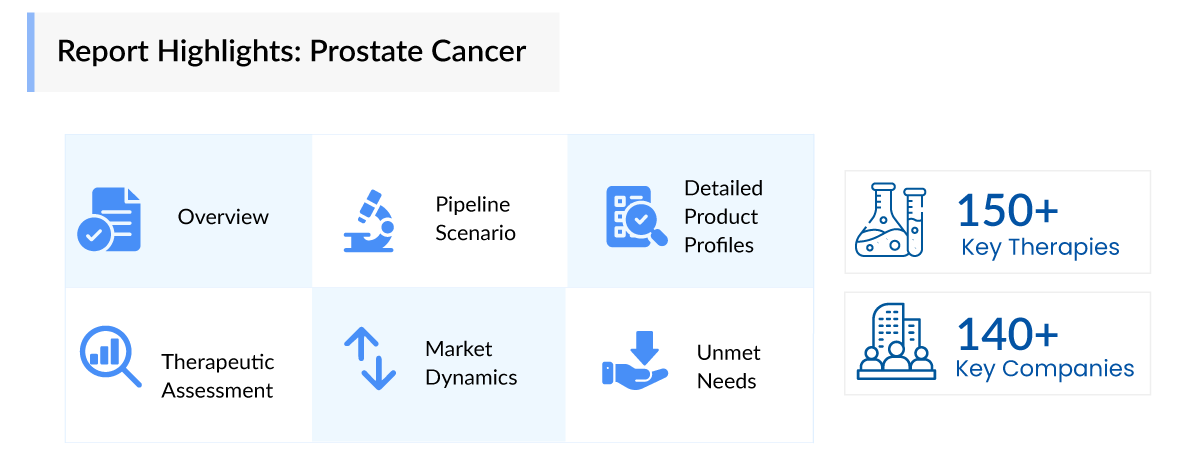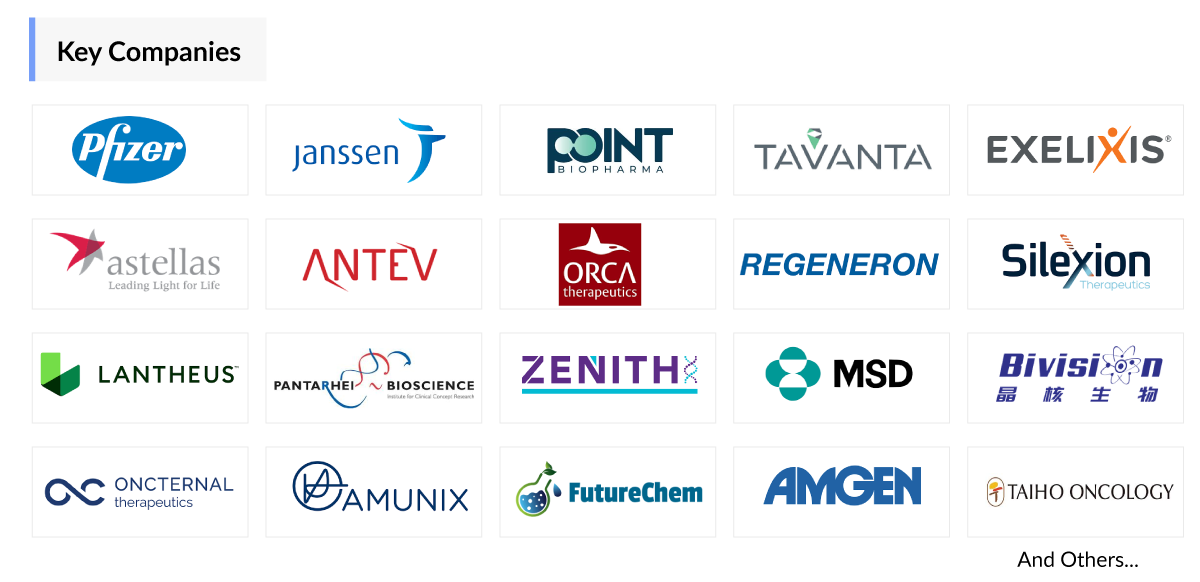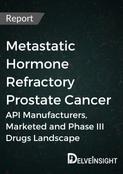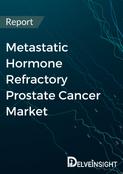Prostate Cancer Pipeline
DelveInsight’s, “Prostate Cancer - Pipeline Insight, 2026,” report provides comprehensive insights about 140+ companies and 150+ pipeline drugs in Prostate Cancer pipeline landscape. It covers the pipeline drug profiles, including clinical and nonclinical stage products. It also covers the therapeutics assessment by product type, stage, route of administration, and molecule type. It further highlights the inactive pipeline products in this space.
Geography Covered
- Global coverage
Prostate Cancer Understanding
Prostate Cancer: Overview
Prostate Cancer begins when cells in the prostate gland start to grow out of control. The prostate is a gland found only in males. It makes some of the fluid that is part of semen. Prostate cancer is mainly caused due to the changes in the DNA. These changes occur because of mutation in DNA. Prostate cancer is diagnosed when the cancer stage advances and symptoms are visible. However early screening test can be performed to find cancer in people before they show any symptoms.
Signs and Symptoms
Due to the proximity of the prostate gland to the urethra and bladder, variety of urinary symptoms may be accompanied with the development and progession of prostate cancer. Based on the size and location, the tumor may press or constrict the urethra. The constriction may further inhibit the flow of urine. Early prostate cancer symptoms include burning or pain during urination, difficulty urinating, or trouble starting and stopping while urinating; more frequent urges to urinate at night; loss of bladder control; and decreased flow or velocity of urine stream.
Pathophysiology
The molecular pathology of prostate cancer is very complex. In addition to multiple genes, environmental factors such as diet and inflammation are also involved in the pathogenesis of prostate cancer. With the emergence of new investigational tools such as DNA microarray technology, and incorporation of application of application of the field of proteomics to the study of human cancers has made it possible to distinguish indolent from aggressive prostate tumours by molecular fingerprinting. Epidemiologically prostate cancer can be divided into hereditary and sporadic forms.
Diagnosis
Most of the time men suffering from prostate cancer remains asymptomatic until the prostate cancer advances, screening test with PSA test may be important for early detection of disease. Diagnosis is primarily based on a detailed medical history, taking particular note of underlying diseases and medications. Clinical examination and laboratory tests complete the diagnosis. Imaging procedures (i.e., transrectal ultrasonography, and magnetic resonance imaging scans) can provide helpful supporting information. A prostate biopsy can be ordered to confirm the diagnosis.
Treatment
Active Surveillance is the treatment of choice for patients with very low risk of prostate cancer to reduce or delay the morbidity of radial prostatectomy. However, surgery is a common choice for prostate cancer treatment if the disease has not spread outside the prostate gland. For prostate cancer, radical prostatectomy remains the gold standard for surgical management. Radical prostatectomy (RP) has been demonstrated to improve survival among the patients with an intermediate risk of cancer-specific mortality and healthy life expectancy. Immunotherapy encompasses a wide range of therapies to engage the immune system to target malignancies. At present, immunotherapy has made a major impact on the treatment of metastatic cancer and has altered the standard of care for many tumor types. Immunotherapy has been explored in prostate cancer as single-agent therapy and in combination with other immunotherapies.
Unlock comprehensive insights! Click Here to Purchase the Full Epidemiology Report @ Prostate Cancer Prevalence
"Prostate Cancer - Pipeline Insight, 2026" report by DelveInsight outlays comprehensive insights of present scenario and growth prospects across the indication. A detailed picture of the Prostate Cancer pipeline landscape is provided which includes the disease overview and Prostate Cancer treatment guidelines. The assessment part of the report embraces, in depth Prostate Cancer commercial assessment and clinical assessment of the pipeline products under development. In the report, detailed description of the drug is given which includes mechanism of action of the drug, clinical studies, NDA approvals (if any), and product development activities comprising the technology, Prostate Cancer collaborations, licensing, mergers and acquisition, funding, designations and other product related details.
Report Highlights
The companies and academics are working to assess challenges and seek opportunities that could influence Prostate Cancer R&D. The therapies under development are focused on novel approaches to treat/improve Prostate Cancer.
Prostate cancer Recent Developments
- In September 2024, Ipsen announced that the Phase III CONTACT-02 trial for Cabometyx® and atezolizumab in mCRPC showed a non-significant improvement in overall survival but met the progression-free survival (PFS) endpoint.
- In September 2024, Foundation Medicine received FDA approval for FoundationOne®CDx and Liquid CDx as companion diagnostics for Lynparza® in BRCA-mutated mCRPC.
- In July 2024, the ARANOTE trial showed that NUBEQA® plus ADT significantly improved radiological PFS in metastatic hormone-sensitive castrate-resistant prostate cancer (mHSPC).
- In July 2024, the FDA granted fast-track designation to SYNC-T SV-102 for metastatic castrate-resistant prostate cancer (mCRPC).
- In June 2024, Kangpu Biopharmaceuticals received FDA approval for a Phase II/III trial of KPG-121 with Abiraterone for mCRPC.
- In May 2024, Fusion Pharmaceuticals began the Phase 2 AlphaBreak trial of FPI-2265 in mCRPC patients.
- In April 2024, Astellas Pharma received European approval for XTANDI™ in high-risk biochemical recurrent non-metastatic hormone-sensitive prostate cancer (nmHSPC).
- In April 2024, FibroGen announced positive Phase 1 trial data for FG-3246 in mCRPC.
- On Feb. 12, 2026, BioXcel Therapeutics, Inc. announced that the FDA granted Fast Track designation for BXCL701 with a CPI to treat metastatic small cell neuroendocrine prostate cancer (SCNC) in patients progressing on chemotherapy. This designation allows for expedited development and review by the FDA.
- On November 16, 2023, the FDA approved enzalutamide (Xtandi) for non-metastatic castration-sensitive prostate cancer (nmCSPC) with high-risk biochemical recurrence.
Prostate Cancer Emerging Drugs Chapters
This segment of the Prostate Cancer report encloses its detailed analysis of various drugs in different stages of clinical development, including phase II, I, preclinical and Discovery. It also helps to understand clinical trial details, expressive pharmacological action, agreements and collaborations, and the latest news and press releases.
Prostate Cancer Emerging Drugs
Niraparib: Janssen Research & Development
Niraparib is an orally administered selective poly ADP-ribose polymerase (PARP) inhibitor. In April 2016, Janssen entered a worldwide (except Japan) collaboration and license agreement with TESARO for exclusive rights to niraparib in prostate cancer. In the US, niraparib is indicated for the treatment of adult patients with recurrent epithelial ovarian, fallopian tube, and primary peritoneal cancer who are in a complete or partial response to platinum-based chemotherapy. Niraparib is currently marketed as ZEJULA by TESARO, an oncology-focused business within GSK. The drug is currently being evaluated in Phase III clinical trials to treat patients with metastatic castration-resistant prostate cancer (mCRPC) and metastatic hormone-sensitive prostate cancer (mCSPC).
ZEN 3694: Zenith Epigenetics
ZEN-3694 is an orally bioavailable, potent, small molecule BET inhibitor that selectively binds to both bromodomains of the BET proteins. The drug candidate was discovered and developed from a BET bromodomain inhibitor platform. Bromodomain and Extra-Terminal domain (BET) family of proteins (BRD2, BRD3, BRD4, and BRDT) can bind acetylated lysines through their tandem bromodomains to promote gene transcription. BET bromodomain inhibitors (BETi) target super enhancers and inhibit several programs involved in tumorigenesis such as proliferation, metastasis, invasion, and immune evasion. The drug is currently being evaluated in the Phase II stage of its development for the treatment of Prostate cancer.
Ladiratuzumab vedotin: Seagen
Ladiratuzumab vedotin is a novel investigational ADC targeted to LIV-1. Most metastatic breast cancers express LIV-1, which also has been detected in several other cancers, including lung, head and neck, esophageal and gastric. Ladiratuzumab vedotin utilizes Seattle Genetics’ proprietary ADC technology and consists of a LIV-1-targeted monoclonal antibody linked to a potent microtubule-disrupting agent, monomethyl auristatin E (MMAE) by a protease-cleavable linker. This novel ADC is designed to bind to LIV-1 on cancer cells and release the cell-killing agent into target cells upon internalization. Ladiratuzumab vedotin may also cause antitumor activity through other mechanisms, including activation of an immune response by induction of immunogenic cell death. Currently, the drug is in the Phase II stage of its development for the treatment of Prostate Cancer.
FOR46: Fortis Therapeutics
FOR46 is a fully human antibody conjugated to a potent payload, depending on the indication. Fortis Therapeutics is developing FOR46, a novel antibody-drug conjugate (ADC) against CD46, for the treatment of metastatic castration-resistant prostate cancer and late-stage multiple myeloma. The Company is also evaluating additional indications for FOR46. Currently, the drug is in the Phase I/II stage of its development for the treatment of Prostate Cancer.
REGN5678: Regeneron Pharmaceuticals
REGN5678 is designed to bind to CD28 on cytotoxic T-lymphocytes (CTLs) and PSMA on tumor cells. By binding to the costimulatory T-cell-specific surface glycoprotein and tumor-associated antigen, the drug candidate could activate CTLs and direct them to attack cancer cells. Regeneron identified the targeting of CD28 on previously activated T cells as a way to reduce toxicity compared to CD3 bispecifics. Currently, the drug is in the Phase I/II stage of its development for the treatment of Prostate Cancer.
Take Your Research to the Next Level! Click Here to Get Access to the Full Pipeline Report @ Prostate Cancer Treatment Market Size
Prostate Cancer: Therapeutic Assessment
This segment of the report provides insights about the different Prostate Cancer drugs segregated based on following parameters that define the scope of the report, such as:
Major Players in Prostate Cancer
There are approx. 140+ key companies which are developing the therapies for Prostate Cancer. The companies which have their Prostate Cancer drug candidates in the most advanced stage, i.e. phase III include, Janssen Research & Development.
Phases
DelveInsight’s report covers around 150+ products under different phases of clinical development like
- Late stage products (Phase III)
- Mid-stage products (Phase II)
- Early-stage product (Phase I) along with the details of
- Pre-clinical and Discovery stage candidates
- Discontinued & Inactive candidates
Route of Administration
Prostate Cancer pipeline report provides the therapeutic assessment of the pipeline drugs by the Route of Administration. Products have been categorized under various ROAs such as
- Oral
- Parenteral
- Intravenous
- Subcutaneous
- Topical.
Molecule Type
Products have been categorized under various Molecule types such as
- Monoclonal Antibody
- Peptides
- Polymer
- Small molecule
- Gene therapy
Product Type
Drugs have been categorized under various product types like Mono, Combination and Mono/Combination.
Prostate Cancer: Pipeline Development Activities
The report provides insights into different therapeutic candidates in phase II, I, preclinical and discovery stage. It also analyses Prostate Cancer therapeutic drugs key players involved in developing key drugs.
Pipeline Development Activities
The report covers the detailed information of collaborations, acquisition and merger, licensing along with a thorough therapeutic assessment of emerging Prostate Cancer drugs.
Prostate Cancer Report Insights
- Prostate Cancer Pipeline Analysis
- Therapeutic Assessment
- Unmet Needs
- Impact of Drugs
Prostate Cancer Report Assessment
- Pipeline Product Profiles
- Therapeutic Assessment
- Pipeline Assessment
- Inactive drugs assessment
- Unmet Needs
Key Questions
Current Treatment Scenario and Emerging Therapies:
- How many companies are developing Prostate Cancer drugs?
- How many Prostate Cancer drugs are developed by each company?
- How many emerging drugs are in mid-stage, and late-stage of development for the treatment of Prostate Cancer?
- What are the key collaborations (Industry–Industry, Industry–Academia), Mergers and acquisitions, licensing activities related to the Prostate Cancer therapeutics?
- What are the recent trends, drug types and novel technologies developed to overcome the limitation of existing therapies?
- What are the clinical studies going on for Prostate Cancer and their status?
- What are the key designations that have been granted to the emerging drugs?
For More In-depth Information @ Latest DelveInsight Blogs








